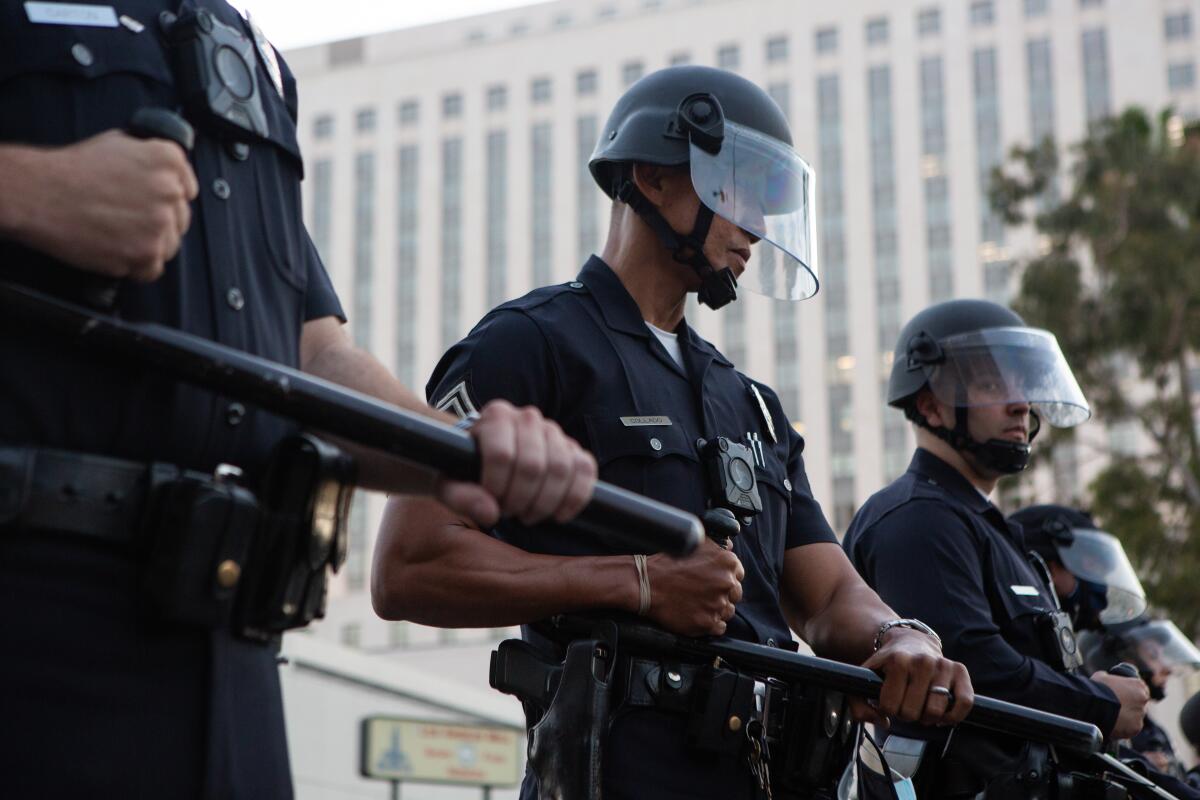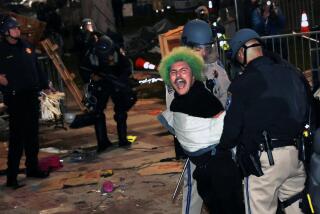Class-action suit against LAPD adds fresh claims of injury, anguish among protesters

A lawsuit alleging violent abuses of power by Los Angeles police during recent protests has been greatly expanded to include more details on demonstratorsâ injuries and their allegations of mistreatment, as well as explicit claims of poor leadership among top police brass.
First filed earlier this month by the Los Angeles chapter of the National Lawyers Guild, Black Lives Matter and Los Angeles Community Action Network, the lawsuit was amended Sunday to provide a more complete breakdown of arrests â there were more than 3,000 over the course of several days â and accuses the LAPD of repeatedly misapplying the law to clear the streets. The lawsuit says demonstratorsâ constitutional rights were violated and many were left bloodied and bruised.
âWe wanted to show the scope of what happened over all of these days and the range of injuries,â said Carol Sobel, a longtime civil rights attorney who is helping to represent the plaintiffs. âWhatâs extraordinary about this is how many people got shot in the upper torso or the head, because those are potentially deadly strikes.â
The updated lawsuit also elaborates on the possible exposure of arrestees to the coronavirus after being crammed on buses for hours, often for infractions that the plaintiffs argue do not legally justify arrest or detention, only citations on the street. It accuses LAPD Chief Michel Moore of condoning such arrests despite knowing the risks posed by the virus, and of ordering the types of force that can severely wound demonstrators, including the firing of foam and sponge bullets into crowds.
âThese were not just poorly trained officers,â Sobel said. âThese were mis-trained officers being directed by the chief.â
Police declined to comment on the specific allegations.
The expansion of the class-action lawsuit, based on new information and images from more than 1,000 people who have been in touch with the Lawyers Guild and other attorneys in the case, follows a Times investigation that found LAPD officers wounded many demonstrators using batons and less-lethal projectiles, often in ways that likely violated protocol.
It also comes amid mounting litigation over the LAPDâs response to days of protest at the end of last month and early this month over the killing of George Floyd in Minneapolis and the killings of other black men and women at the hands of police across the country.
Separately on Monday, a 22-year-old woman named Laura Montilla filed her own lawsuit against the LAPD and other law enforcement officials, alleging abuses â including that she was surrounded, or âkettled,â by police officers ahead of an evening curfew that had been bumped up without much warning, then blocked from leaving, arrested, and left in handcuffs for hours.
Suits against the LAPD also include one brought by a woman who said she was shot in the head with a police projectile while in her car near protests in the Fairfax district, as well as lawsuits by the ACLU and other advocacy organizations over the departmentâs implementation of curfews in the city for several nights in a row.
Capt. Gisselle Espinoza, an LAPD spokeswoman, said the department didnât comment on pending litigation but was âfully committed to investigating every allegation of misconduct or excessive force related to the recent protestsâ and had assigned 40 internal affairs investigators to the task.
The department has previously acknowledged receiving at least 74 complaints against officers, about 40 of them alleging excessive force. It has placed at least 10 officers on desk duty pending the outcome of investigations but has not punished any officers.
According to protocol, officers can use batons to push people in large crowds that they are trying to disperse but are only meant to strike people with batons when those individuals present a danger. Officers are allowed to shoot projectiles at peopleâs belt line but not at their heads or necks. They are not supposed to shoot projectiles into crowds but at specific targets, and they are not supposed to shoot them at people who are running away.
The expanded lawsuit alleges the LAPD violated many of its own rules, as well as other laws governing how and whether police can confront protesters in the street.
One plaintiff, Abigail Rodas, said she was trying to leave a protest in the Fairfax district on May 30 when LAPD officers started shooting projectiles at her and a friend. She said she was shot in the face and lost consciousness. The lawsuit includes a picture of Rodasâ bloodied mouth with gauze coming out of it.
Rodas was driven to Cedars-Sinai Medical Center, where she was diagnosed with a severe fracture to her right mandible and rushed into surgery, the lawsuit claims. She left the hospital two days later with stitches inside and outside her mouth and a steel plate along her jawbone, it claims.
âShe was unable to talk for about 10 days. For one week, she could only drink liquids and is still on a soft-food diet,â the lawsuit states. âNearly three weeks after the injury, she has screws in her gums and rubber bands to immobilize her jaw while the bones rejoin.â
Another plaintiff, Jeffrey Trotter, 51, who lives at the Rosslyn Hotel on skid row, said he was walking home when officers in riot gear confronted him and asked him where he was going. After he said he was returning home from a walk to Rite-Aid, the lawsuit states, the officer without further discussion âtook a few steps back and shot plaintiff with hard rubber or foam projectiles at close range four times, once in the chest, twice in the stomach, and once on the left hand.â
He was in intense pain for more than a week, the lawsuit says, and the projectiles tore skin from his chest and hand.
In her own lawsuit, filed Monday against Moore, Los Angeles County Sheriff Alex Villanueva and other unidentified officers, Montilla claims that she was sexually assaulted by officers.
Multiple officers groped her breasts and vagina, she claims in the lawsuit. She did not identify the officers. She also said an LAPD officer handcuffed her so tightly in zip ties that she lost feeling in her right hand and had âabrasions and a bruiseâ on her wrist for days. She said she and others arrested alongside her, including homeless individuals who would have been exempt from the curfew, were subjected to âtorturous, inhumane conditions.â
She said she was loaded on a bus along with others, who started to panic and scream in the dark. She said they were given no explanation by police as to where they were being taken and that officers subjected them to blaring heavy metal music.
âEvery single officer who was present that day was complicit in that cruelty,â Montilla said in an interview Monday. âThe police I encountered did what they did because they are protected by a system that does not hold them accountable.â
The sheriffâs office said it did not comment on pending litigation.
Both Montilla and the plaintiffs in the expanded lawsuit argue that the LAPD unnecessarily exposed them to the coronavirus, including by not requiring officers to wear masks. Medical experts have criticized the departmentâs use of crowded buses to transport nonviolent curfew violators, given the ongoing pandemic.
The advocate organizations that filed the expanded lawsuit laid the blame for that and for many of the most severe injuries to protesters directly at the feet of Moore, who oversaw the departmentâs response and was personally on the scene in the Fairfax District on May 30, when some of the most brutal police enforcement occurred.
âChief Moore authorized, approved, and ratified the unwarranted assault on the protesters with projectiles and batons,â the lawsuit states. âAlternatively, he did nothing to stop the assault on the protesters as he witnessed it.â
Asked on Monday about the claims in the lawsuit, Moore deferred to Espinozaâs statement, adding only that officers were âthe subject of countless assaults as well as witnessed vandalism, fires and looting.â
Moore previously said he was forced to give dispersal orders and to enforce curfews at various points during the protests because things were spiraling out of control and peopleâs lives were in danger.
He also said he saw some things he didnât like, including the use of batons by some officers, and made some orders in the field to halt them.
Police previously said that dozens of officers were injured, including an officer whose skull was fractured.
More to Read
Sign up for Essential California
The most important California stories and recommendations in your inbox every morning.
You may occasionally receive promotional content from the Los Angeles Times.











